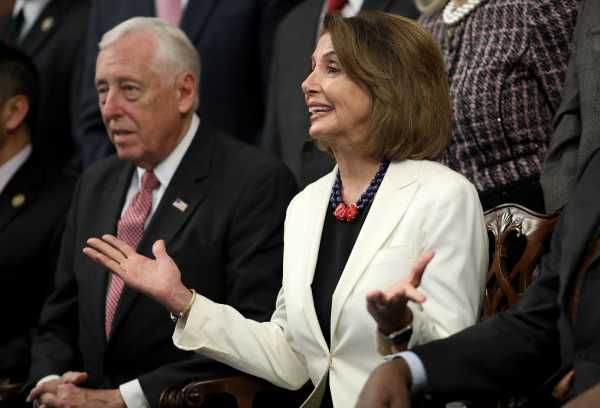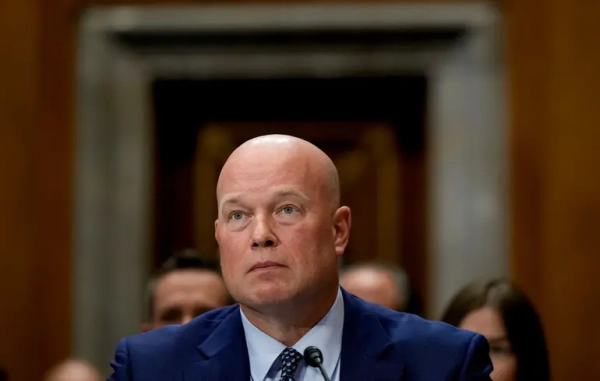
Now that House Democrats are coming into power on January 3, they have a lot on their to-do list — and some items are competing with others.
They say they want to work with President Donald Trump on two of his stated goals — passing a massive infrastructure bill and a bill bringing down prescription drug prices — all while rigorously investigating his administration and myriad business entanglements.
Democrats are walking a tightrope here, but they have an endgame: making the case to American voters they are the best party to govern ahead of the 2020 presidential elections.
Many of the bills House Democrats want to pass will inevitably not even be brought to the floor in the Republican-controlled Senate, and even if they miraculously passed both chambers, they would still face the hurdle of clearing Trump’s desk. So until Democrats win a majority in the Senate or take back the White House, they’re essentially hamstrung — making the next two years absolutely crucial.
Coming off two years of dysfunction under Republican rule in Washington, Democrats, who will almost certainly be led by current House Minority Leader Nancy Pelosi, want to show they are committed to getting bills passed that bring down health care costs, stop mass shootings in America, and address the climate change crisis.
Here is House Democrats’ upcoming agenda, briefly explained.
Top tier priorities
House Democratic leadership made their top priorities clear starting in May of last year, in the middle of the 2018 election season: They plan to focus on bread-and-butter issues including jobs, fixing roads and bridges, and lowering health care costs. They are also putting a major focus on anti-corruption legislation.
Tackling corruption: This is House Resolution 1, the first bill House Democrats will take up in early January — a broad anti-corruption and pro-democracy reform bill. It does three main things: institute campaign finance reform, institute new anti-lobbying rules, and expand voting rights in the country, including things like automatic voter registration.
It has little chance of passing the Senate or being signed by Trump, but Democrats are trying to make a statement: They are serious about getting money out of politics and Republicans aren’t (assuming they don’t cooperate on the bill).
Protecting voting rights: The Voting Rights Advancement Act would restore key provisions of the landmark 1965 Voting Rights Act that were invalidated by the US Supreme Court’s 2013 Shelby County v. Holder decision. Essentially, the bill would give the federal government the ability to really scrutinize states with a history of voter discrimination, assigning election observers to states or municipalities with repeated problems.
It was initially part of HR 1, but Democrats recently took it out because they anticipate a long and drawn-out legal battle for the bill on the unlikely chance it passes Congress and Trump signs it.
Infrastructure and jobs: Democrats want to work with Trump on one of the few areas where the two parties agree: the need for better infrastructure in the US. Democrats want to fix ailing roads and bridges and put in rural broadband, something that would likely be paid for with an increase in the gas tax. Democrats also want to expand access to education and skills training and spur entrepreneurship as part of a larger effort to create jobs.
Trump has frequently put infrastructure as one of his top priorities, but Republicans couldn’t even agree with his administration’s proposal when it came out in February 2018. Action on this issue depends on whether the White House feels like negotiating with Democrats.
Lowering prescription drug prices: This is another area where Trump and Democrats have said they agree: lowering skyrocketing drug prices. It’s a very politically popular thing to do, and could come in the form of changes to Medicare or certain drug rebate laws. But the Pharma lobby is powerful, and it has so far convinced Trump to take a softer approach.
But with Democrats controlling the House, a new opportunity could arise. It’s perhaps the most doable thing for Trump and Democrats to compromise on in 2019, but so far, Democrats are waiting for concrete signals the White House is ready to take action.
Stabilizing the Affordable Care Act: The ACA is under assault from the Trump administration and conservative states, who have filed a lawsuit asking the law to be declared unconstitutional. Democrats are looking at passing a bill to stabilize the law, and fight back against the lawsuit. Remember, the ACA was Nancy Pelosi’s signature piece of legislation passed in 2010, so keeping the health care law alive is very important to her.
Also, expect Trump to fight her very hard on this front — he has shown very little interest in the details of health care.
Other priorities
Common-sense gun reform: Reflecting on the six-year anniversary of the Newtown shooting at a recent press conference, Pelosi committed to bringing gun legislation to the floor, including a universal background check bill. She’s also working with members of a Democratic task force on gun violence that will introduce even more bills in the coming year.
They plan to have the universal background check bill be bipartisan, but again, it has a tough path to even make it to the Senate floor.
Action on climate change: One of the burgeoning fights within the Democratic Party during the start of the new session is how far the party should go to address climate change. Progressive star Alexandria Ocasio-Cortez is lobbying hard for a plan called the “Green New Deal,” and the establishment of a select committee to push climate change legislation. Much of that could be wrapped up into an infrastructure bill, putting Americans to work building renewable energy sources.
But also expect Democrats on the House Energy and Commerce Committee to conduct oversight into the Trump administration’s rollback of environmental regulations.
Immigration reform: After a drawn-out and bitter fight over immigration in 2018, House Democrats eagerly want to fix the Deferred Action for Childhood Arrivals program and give young, undocumented immigrants a pathway to citizenship. But this is running up against Trump’s desire for $5 billion for a border wall, something Democrats say they won’t entertain.
There could be a bipartisan bill that contains a DACA fix and increased border security out later in the session, but many immigration advocates say they want a clean DREAM Act for a pathway to citizenship.
Appropriations and spending bills: Trump’s border wall has been at the root of the January government shutdown, and that was even at a time when Trump’s party controlled all three branches of government. Trump is again fighting with Democrats and Republicans alike over how much money should be put aside for his border wall, and more grandstanding over this is sure to come.
Foreign policy: There are two big areas Democrats plan to focus on when it comes to foreign policy; passing a resolution to end US involvement in Yemen, and slapping tougher sanctions on Russia.
This is the rare place where they will be in agreement with Senate Republicans. The Senate already passed a resolution to end US involvement in Yemen’s ongoing civil war, and Senate Republicans have been eager to put sanctions on Russia after its meddling in the 2016 election. Trump isn’t so happy about either of these, but Congress is a powerful player in matters of starting or ending conflict.
House Democrats’ investigations
The area where Democrats may have the most power in the next Congress is investigations. With Republicans in the Senate and White House, Democrats ultimately don’t have a lot of power to pass policy — but they do have the power to subpoena the president.
With the never-ending parade of scandals and departures in the Trump administration, Democrats are also going to use their power to conduct extensive oversight into the executive branch: everything from Trump firing FBI Director James Comey, to the administration’s family separation policy, to the president’s ties to foreign countries.
Democrats have been cautious when it comes to the subject of impeachment, being clear they won’t rush to conclusions before special counsel Robert Mueller’s investigation is complete. But with Republicans doing little to no oversight on Trump over the past two years, there is a ton for them to investigate.
Here are some of the most important things Democrats will look at:
- Jared Kushner’s security clearances and business ties to foreign governments.
- Members of the Trump campaign’s contacts with Russians during the 2016 election.
- Members of the Trump administration’s use of private email for government-related business.
- The Trump administration’s response to Hurricane Maria in Puerto Rico.
- More detail into the administration’s past family separation policy and its impacts. House Democrats will ask for details about the separated children and where they are living.
- The Trump administration’s attempt to undermine the Affordable Care Act.
These are just a small number of the subpoenas Democrats plan to send, and the list is likely to grow even longer as they take control in 2019.
Sourse: vox.com






